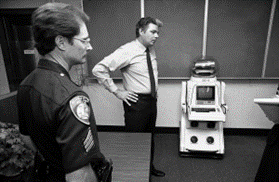
Can You Sue a Robot?
February 20th 2024
Disclaimer: The information provided in this blog post is for educational purposes and not legal advice. For specific legal inquiries, please consult an attorney.
DID YOU KNOW: The first arrest of a robot occurred in 1982 when a robot illegally distributed business cards in Beverly Hills.

As robots can execute surgery, drive cars, and even offer companionship, the lines of liability and responsibility are becoming blurred. If a robot harms someone, who is to blame? Is it the robot itself, the owner, or the maker?
Currently, the US legal system does not acknowledge a robot as a legal entity if it malfunctions or injures someone. Therefore, suing a robot directly is not possible. Instead, depending on the circumstances, liability would normally lie with the operator or the manufacturer. When it comes to harm, the law usually looks at who is negligent and in control. However, with robots, control is a very complex issue.
Let's consider a scenario where a robotic assistant injures a human due to a programming error. The traditional approach would be to hold the manufacturer liable for damages under product liability law. But what if the robot was acting upon a machine learning algorithm and made a decision that its creators could not foresee? In such cases, the law might need to evolve.
Some legal experts propose giving robots their legal entity that would be liable. Although this idea might make cases easier, it also pleads the question of what constitutes robots' "personhood" and rights. If a defect or design flaw in a robot results in harm to others, the manufacturer may be accountable under Federal product liability laws. However, if misuse or poor maintenance results in damage, the user may be held liable.
Experts are actively exploring these complexities, considering the implications of advanced AI and the potential need for laws that specifically address the autonomous decisions made by robots. This debate includes a wide range of AI-driven technologies, not just autonomous vehicles. While the law evolves to keep up with technology, staying informed and prepared is crucial.
At LISKE Forensics, we specialize in providing expert analysis and consultation on cutting-edge legal issues involving technology.
For detailed inquiries or to discuss a specific case involving robot liability, reach out to our team at experts@liskeforensics.com or call us at 1-888-674-3508.
Sources:
- National Conference of Commissioners on Uniform State Laws, Uniform Automated Operation of Vehicles Act.
- Restatement (Third) of Torts: Products Liability.
WHY LISKE?
- Leader in accident and injury reconstruction for 35+ years
- High-level approach ensures no causation element is overlooked
- Multi-disciplined team of scientists, engineers, and ACTAR-accredited experts
- Provides foundational pillar for litigation strategy and resolution
- Reliable in building causation or rebutting opposition conclusions
- Utilizes next-gen technology for comprehensive, science-based analysis
- Dedicated to unparalleled customer experience
